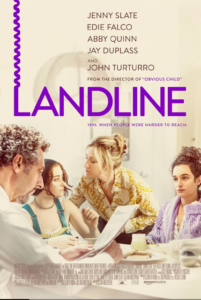
 Director Gillian Robespierre’s follow-up to her terrific 2014 “Obvious Child” is equal parts sublime and frustrating. Following a middle-class family as they grapple with maturity and failure, “Landline” is a low key drama that’s not funny enough nor heavy enough to completely satisfy viewers expecting a bigger, better repeat on previous success. The good news for Slate and Robespierre is that there is enough good in “Landline” to leave us wanting more.
Director Gillian Robespierre’s follow-up to her terrific 2014 “Obvious Child” is equal parts sublime and frustrating. Following a middle-class family as they grapple with maturity and failure, “Landline” is a low key drama that’s not funny enough nor heavy enough to completely satisfy viewers expecting a bigger, better repeat on previous success. The good news for Slate and Robespierre is that there is enough good in “Landline” to leave us wanting more.
Set in 1995, Dana (Slate), Ali (Abby Quinn), Alan (John Turturro), and Pat (Edie Falco), form a nuclear family living in Manhattan. Dana lives with her fiancee Ben (Jay Duplass) and works a uneventful job. Her sister Ali is still in high school and spends a lot of time with her boyfriend experimenting with sex and drugs. When Dana bumps into an old boyfriend, she begins to have second thoughts about her relationship.
Meanwhile Alan and Pat have been having trouble. Cracks in their marriage seem obvious as Alan tries to pursue a career as a playwright while ignoring Pat’s needs and opinions. And as the icy relations get colder, Ali may have discovered that Alan is having an affair.
Robespierre works here from a script she wrote with Elisabeth Holm. Both worked together on “Obvious Child.” Adding characters with “Landline” does make their narrative bigger, but it also makes the film less focused. Balancing the four stories means that one story gets the short shrift. And maybe one of those stories would have been more interesting than the ones pursued in the finished product.
For example, Edie Falco’s Pat seems like an afterthought. And I love Falco, having binged on each and every episode of “Nurse Jackie.” I suspect that while many viewers are big Jenny Slate fans, an equal amount will be tuning in to “Landline” to catch Falco in a juicy role. Unfortunately, we don’t get enough Falco.
But at the same time, we don’t get enough Slate either. As Dana, Slate is on a downward slide reminiscent of her turn in “Obvious Child.” This time around, it’s not nearly as effective, and maybe that’s because we don’t understand Dana’s motivations. We know that she’s bored with her fiancee, but questions swirl about her reasoning that are not answered. And ambiguity is fine, but Robespierre is intent by the end of “Landline” in tying up many loose ends neatly. This approach seems a little artificial and forced.
Still, the pacing of the film is breezy and keeps us interested. The first third teases a narrative that could build to something approaching profundity. But darker moments ultimately give way to softness. The 1995 time period is perfectly captured, and “Landline” feels like it was made at that time. Clearly, we will see more films set in the 1990s moving forward.
My grumbling aside, I’m complaining that “Landline” isn’t an improvement over one of my favorite films of 2014. To be clear, “Landline” is a good film that could have been a great one. Let’s hope that the partnership between the Robespierre/Holm team and the massively talented Slate get another go, because they have something important to say about relationships and coming of age.

